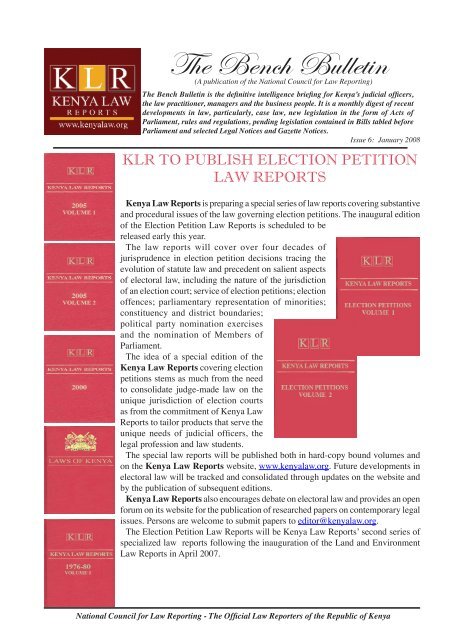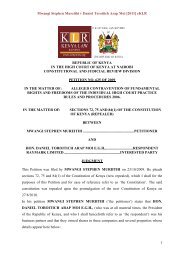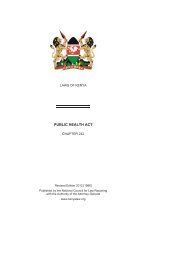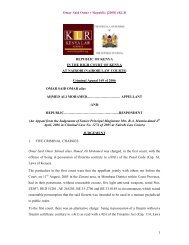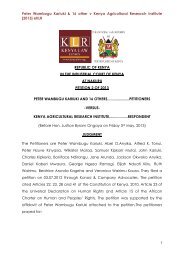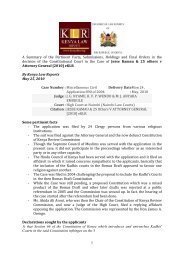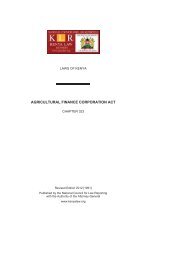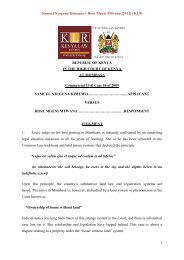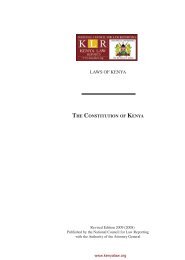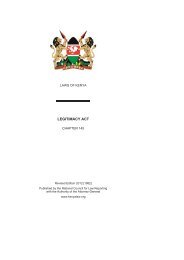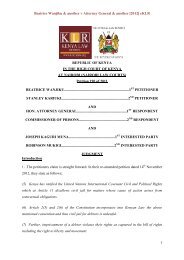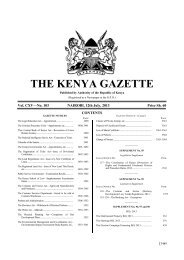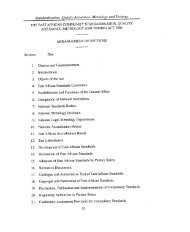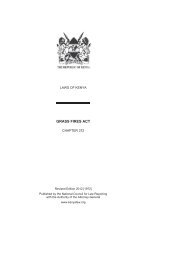The Bench Bulletin - Kenya Law Reports
The Bench Bulletin - Kenya Law Reports
The Bench Bulletin - Kenya Law Reports
Create successful ePaper yourself
Turn your PDF publications into a flip-book with our unique Google optimized e-Paper software.
<strong>The</strong> <strong>Bench</strong> <strong>Bulletin</strong>(A publication of the National Council for <strong>Law</strong> Reporting)<strong>The</strong> <strong>Bench</strong> <strong>Bulletin</strong> is the definitive intelligence briefing for <strong>Kenya</strong>’s judicial officers,the law practitioner, managers and the business people. It is a monthly digest of recentdevelopments in law, particularly, case law, new legislation in the form of Acts ofParliament, rules and regulations, pending legislation contained in Bills tabled beforeParliament and selected Legal Notices and Gazette Notices.Issue 6: January 2008KLR to publish Election Petition<strong>Law</strong> <strong>Reports</strong><strong>Kenya</strong> <strong>Law</strong> <strong>Reports</strong> is preparing a special series of law reports covering substantiveand procedural issues of the law governing election petitions. <strong>The</strong> inaugural editionof the Election Petition <strong>Law</strong> <strong>Reports</strong> is scheduled to bereleased early this year.<strong>The</strong> law reports will cover over four decades ofjurisprudence in election petition decisions tracing theevolution of statute law and precedent on salient aspectsof electoral law, including the nature of the jurisdictionof an election court; service of election petitions; electionoffences; parliamentary representation of minorities;constituency and district boundaries;political party nomination exercisesand the nomination of Members ofParliament.<strong>The</strong> idea of a special edition of the<strong>Kenya</strong> <strong>Law</strong> <strong>Reports</strong> covering electionpetitions stems as much from the needto consolidate judge-made law on theunique jurisdiction of election courtsas from the commitment of <strong>Kenya</strong> <strong>Law</strong><strong>Reports</strong> to tailor products that serve theunique needs of judicial officers, thelegal profession and law students.<strong>The</strong> special law reports will be published both in hard-copy bound volumes andon the <strong>Kenya</strong> <strong>Law</strong> <strong>Reports</strong> website, www.kenyalaw.org. Future developments inelectoral law will be tracked and consolidated through updates on the website andby the publication of subsequent editions.<strong>Kenya</strong> <strong>Law</strong> <strong>Reports</strong> also encourages debate on electoral law and provides an openforum on its website for the publication of researched papers on contemporary legalissues. Persons are welcome to submit papers to editor@kenyalaw.org.<strong>The</strong> Election Petition <strong>Law</strong> <strong>Reports</strong> will be <strong>Kenya</strong> <strong>Law</strong> <strong>Reports</strong>’ second series ofspecialized law reports following the inauguration of the Land and Environment<strong>Law</strong> <strong>Reports</strong> in April 2007.National Council for <strong>Law</strong> Reporting - <strong>The</strong> Official <strong>Law</strong> Reporters of the Republic of <strong>Kenya</strong>
Digest of Cases ReportedCourt of AppealCivil Practice and Procedure - representative suit – circumstances in which one or more persons may sue or be suedon behalf of other persons – procedure in bringing a representative suit – meaning of “persons having the sameinterest” in a suit – whether same interest means the same transaction – Civil Practice and Procedure RulesOrder I rule 8.<strong>Kenya</strong> Airways Corporation Ltd v Tobias Oganya Auma & 6 others...............................................................................7Civil Practice and Procedure - consent - consent order - review of a consent order - circumstances in which a consentmay be reviewed - party seeking to have a consent reviewed or set aside on grounds of duress, illegality, publicpolicy, undue influence and misrepresentation - party alleging that the consent was an attempt to enforce anillegal agreement - allegation of unjust enrichment - duty of the person seeking to set aside the consent toestablish the grounds for setting it aside - appeal against the decision of the High Court declining to review theconsent - whether the High Court had failed to properly consider the matters before it - Civil Procedure RulesOrder 2, Order 44 rule 1Samson Munikah (practicing as Munikah & Company Advocates) v. Wedube Estates Ltd ........................................9Civil Practice and Procedure - court fees - filing fees - suit by advocate - suit against client for fees for servicesrendered - whether such suits are exempted from court filing fees - whether a Deputy Registrar has power toexempt an advocate plaintiff from paying the fees - whether a plaint that has been filed without the payment offiling fees is a valid plaint - Civil Procedure Rules Order IV rule 2(2) - Advocates Act (Cap. 16) section 48, 49South Nyanza Sugar Company Ltd v Samuel Osewe Ochillo t/a Ochillo & Company Advocates ................................7Civil Practice and Procedure – jurisdiction – jurisdiction of the Court of Appeal – whether the Court of Appealhas a residual jurisdiction to re-open an appeal which it has previously heard and decided – notice of motionapplication seeking to re-open an appeal on the ground that one of the judges who had presided over the appealwas biased – whether such a motion could be entertained - Constitution of <strong>Kenya</strong> section 64, 77(9)Jasbir Singh Rai & 3 others v Tarlochan Singh Rai & 4 others ........................................................................................6Criminal Practice and Procedure - trial - fair trial - rights of an arrested person – right to be brought to court within areasonable time - section 72(3)(b) of the Constitution – complaint that the accused had not been brought to courtwithin a reasonable time – complaint being raised for the first time in the Court of Appeal in an appeal againstconviction – whether such was the proper time and forum for raising and dealing with such a complaint.Samuel Ndungu Kamau & another v Republic ..................................................................................................................5Damages – special damages – duty of a party to prove special damages before they can be awarded.<strong>Kenya</strong> Airways Corporation Ltd v Tobias Oganya Auma & 6 others .............................................................................7Employment law – redundancy – termination of employment on account of redundancy -meaning of redundancy – wherethere exits a contract of employment – whether the rules of natural justice may be applied to employmentcontracts – whether a court may prevent an employer from discharging its employees on account of redundancywhere the laws relating to termination of employment are followed and the consent of Trade Unions obtained –whether it is reasonable for a contracted employee to expect to continue in employment until the age of retirementregardless of his productivity or the financial situation of his employer – whether general damages may beawarded in suits based on termination of employment - Trade Disputes Act (Cap. 234) - Regulation of Wages andConditions of Employment Act (Cap. 229)<strong>Kenya</strong> Airways Corporation Ltd v Tobias Oganya Auma & 6 others ..............................................................................7Evidence - circumstantial evidence - where a case depends wholly on circumstantial evidence - murder - accusedperson having been with the deceased moments before her death - whether in such circumstances a rebuttablepresumption arose that the accused had killed the deceased - accused failing to offer any explanation on thematter - whether the accused had been properly convicted for murder - Penal Code sections 203, 204 - EvidenceAct (Cap. 80) section 119.Samuel Ndungu Kamau & another v RepublicEvidence - witness - hostile witness - procedure in declaring a witness hostile - effect of declaring a witness hostile– where a prosecution witness gives evidence favourable to the accused - prosecution not having sought the leaveof the court to cross-examine the witness - whether in the circumstances the trial court had erred in failing toevaluate the evidence of such a witness - Evidence Act (Cap. 80) section 161, 163Edusei Asili Malema v Republic ...........................................................................................................................................9Intellectual Property - trade mark – suit for trade mark infringement and passing off - trade mark dispute betweencigarette manufacturers - Horseman and Sportsman cigarette brands - appellant being the registered ownerof the Sportsman brand and having applied it in trade for over 30 years - Horseman brand introduced by therespondent - whether the Horseman brand was so substantially similar to the Sportsman brand as to causeconfusion among cigarette smokers or consumers – plaintiff’s burden of proof in a trademark infringement suit.British American Tobacco <strong>Kenya</strong> Ltd v Cut Tobacco <strong>Kenya</strong> Ltd .....................................................................................5International law – application of international law – international law applicable where domestic law is uncertain orlacking.<strong>Kenya</strong> Airways Corporation Ltd v Tobias Oganya Auma & 6 others .............................................................................7Issue 6: January 2008
From the CourtsIssue 6: January 2008Court of AppealReported by Michael MurungiIntellectual Property - trade mark – suit for trade markinfringement and passing off - trade mark dispute betweencigarette manufacturers - Horseman and Sportsman cigarettebrands - appellant being the registered owner of theSportsman brand and having applied it in trade for over30 years - Horseman brand introduced by the respondent- whether the Horseman brand was so substantially similarto the Sportsman brand as to cause confusion among cigarettesmokers or consumers – plaintiff’s burden of proof ina trademark infringement suit.British American Tobacco <strong>Kenya</strong> Ltd v Cut Tobacco <strong>Kenya</strong>Ltd [2007] eKLRCourt of Appeal at NairobiP.K. Tunoi, E.O. O’Kubasu & E.M. Githinji JJ.ADecember 20, 2007<strong>The</strong> appellant and the respondent were manufacturers oftwo competing brands of cigarettes, Sportsman and Horseman.In March 1999, the appellant filed a suit in the HighCourt against the respondent seeking various restrainingorders and other relief on account of the respondent’s allegedbreach of the appellant’s registered trade mark. <strong>The</strong> appellantargued that since 1998, the respondent had infringed the trademark by using in the course of trade in <strong>Kenya</strong> a packagingfor its own brand of cigarettes which was so identical to theappellant’s trade mark as to be a deceptive imitation. <strong>The</strong>appellant also claimed that the respondent had passed off itsbrand of cigarettes as those of the appellant.<strong>The</strong> respondent denied the claim and argued that the appellantwas not entitled to the exclusive use of the words andsymbols used on the respondent’s packaging. <strong>The</strong> respondentfurther contended that the trade mark Horseman wasincapable of causing deception or confusion in the minds ofconsumers of cigarettes as each brand of cigarettes had itsown distinctive and individual flavour.At the close of the trial, the High Court found that the packagingfor the respondent’s Horseman brand was not capableof deceiving and that the appellant had failed to establish itscase. <strong>The</strong> suit was therefore dismissed. <strong>The</strong> appellant broughtthis appeal against the decision of the High Court.Held:1. <strong>The</strong>re can be no property rights in a particular colourand there can be no property in general in words descriptiveof goods. Evidence would be needed to show if the get-upof the appellant’s cigarette packet was likely to deceive thecigarette buying public into believing that they were buyingthe respondent’s brand.2. <strong>The</strong> burden of satisfying the court that there has been aninfringement of its trade mark is on the plaintiff. <strong>The</strong> plaintiffhas to prove that there is a resemblance between the twomarks and that such resemblance is deceptive.3. It is the duty of the judge, which he cannot abdicate, todecide whether the trade mark complained of does so nearlyresemble the registered trade mark as to be likely to deceiveor cause confusion in the minds of the public.4. A Court of Appeal will not normally interfere with afinding of fact by the trial court unless it is based on no evidenceor on a misapprehension of the evidence or the Judgeis shown demonstrably to have acted on wrong principles inreaching the findings he did.Appeal dismissed with costs to the respondent.Criminal Practice and Procedure - trial - fair trial -rights of an arrested person – right to be brought to courtwithin a reasonable time - section 72(3)(b) of the Constitution– complaint that the accused had not been brought tocourt within a reasonable time – complaint being raised forthe first time in the Court of Appeal in an appeal againstconviction – whether such was the proper time and forumfor raising and dealing with such a complaint.Evidence - circumstantial evidence - where a case dependswholly on circumstantial evidence - murder - accusedperson having been with the deceased moments beforeher death - whether in such circumstances a rebuttablepresumption arose that the accused had killed the deceased- accused failing to offer any explanation on thematter - whether the accused had been properly convictedfor murder - Penal Code sections 203, 204 - Evidence Act(Cap. 80) section 119.Samuel Ndungu Kamau & another v Republic [2007]eKLRCourt of Appeal at NairobiS.E.O. Bosire, E.O. O’Kubasu & W.S. Deverell JJ.A.December 14, 2007John Kingu (the deceased) had gone missing for a monthbefore his body was found buried in a shallow pit in his homecompound. <strong>The</strong> two appellants had been tried in the HighCourt in connection with the death, convicted for murder andsentenced to death. <strong>The</strong> case against them depended whollyon circumstantial evidence. <strong>The</strong> 2 nd appellant, who had beenthe deceased’s servant, was the last person known to havebeen with the deceased. When the deceased had gone missing,the 2 nd appellant left his employment without notice andwhen the police traced his location, they found some of thedeceased’s personal items in his house.Among the grounds of appeal which the 2 nd appellantraised in his appeal against the decision of the High Court,he stated that after his arrest, he had not been presented tothe court within the period provided under section 72(3)(b)of the Constitution and that the prosecution had not establishedthat the death of the deceased had been caused withmalice aforethought.Held:1. <strong>The</strong> provisions of section 72(3)(b) of the Constitutionare framed in a way which presupposes that a complaint withregard to violation of the right [of an arrested person to bebrought to court within a reasonable time]would either beraised at the trial or in an application under section 84 of theConstitution, where witnesses are normally called or affidavitevidence is presented to prove or rebut a factual proposition.When such a complaint is raised for the first time before theCourt of Appeal, it may not be possible to investigate thetruth or falsity of the allegation.2. Moreover, the complaint of the violation of the 2 ndappellant’s right did not relate to the question whether ornot he had committed the offence for which he had been
<strong>Bench</strong> <strong>Bulletin</strong>with the appellant on the implementation of the redundancywhich, to all intents and purposes, was followed. <strong>The</strong> Ministryof Labour had also been advised about the plannedredundancies.In 1992, the six respondents filed a suit against the appellant“on their behalf and on behalf of 960 ex-employees” ofthe appellant. <strong>The</strong>y averred that the appellant had violatedthe redundancy provisions of the Regulation of Wages andConditions of Employment Act (Cap. 229). <strong>The</strong>y claimedcompensation for loss of service calculated up to the retirementage of 55 years, 36 months’ salary in lieu of notice oftermination of employment, severance pay, unpaid leave andmonies reserved on their Provident Fund. <strong>The</strong> value of themonetary claim added up to Kshs. 2,595,449,629.<strong>The</strong> appellant filed a defence to the suit in which it deniedthe claim and averred, firstly, that due to the undeterminednature of the contractual obligations between the appellantand its employees, the respondents did not have right to file arepresentative suit. Secondly, the appellant stated that it hadcarried out the redundancies in accordance with the terms ofservice of the respondents and the its regulations and finally,that it had complied with the provisions of the law governingpayment and other benefits to each respondent. It statedthat the claim for loss of service and 36 months’ pay in lieuof notice had no legal basis and that the claim for the fundsheld by the Provident Fund should have been made againstthe Trustees of the Fund.In September 1994, the High Court (Shields, J.) issued anorder authorizing the representative suit. <strong>The</strong> main trial commencedin February 1996 and closed on August 29, 2000.In a judgment delivered on February 23, 2001 by MbogholiMsagha, J. the High Court found that the basic reasons for declaringthe respondents redundant were financial constraintsand over-staffing and that those were matters for which therespondents were not to blame. <strong>The</strong> Court found that theappellant company had been mismanaged and that the redundancywas misplaced and illegal. In addition to what theyhad been paid, each respondent was awarded compensationequivalent to the remainder of his or her term of service basedon retirement age but discounted by one third to account forunforeseen eventualities of life. <strong>The</strong> respondents were alsoawarded interest and the costs of the suit.<strong>The</strong> appellant brought this appeal against the decision ofthe High Court.Held:1. Order 1 rule 8 of the Civil Procedure Rules, which makesprovisions regarding representative suits, is an exception tothe general rule that all persons interested in a suit ought tobe made parties to it. <strong>The</strong> object of the rule is to facilitatethe decision in questions in which a large body of personsis interested, without the practical difficulty that may ariseunder the ordinary procedure where each person files aseparate suit.2. <strong>The</strong> conditions necessary to bring a representative suitwithin Order 1 rule 8 are:a. there are numerous persons;b. the persons have the same interest in the suit;c. the authority or permission of the court is obtained forsome of the persons to be represented by one or severalothers;d. notice of the suit is given to all the persons represented.<strong>The</strong>re is no requirement that a person seeking to institutea suit in a representative capacity must establish that he hadobtained the sanction of the persons interested on whosebehalf the suit is proposed to be instituted.3. What is required under the rule is that the parties shouldhave the same interest; it is not necessary that their interestarises from the same transaction.4. <strong>The</strong> respondents in this case had the same interest withinthe meaning of Order 1 rule 8. <strong>The</strong>y all challenged the redundancyvisited upon them by the appellant and claimeddamages and unpaid compensation for loss of service andseverance pay amongst other reliefs.5. As persons having separate causes of action in contractand in tort may have the same interest “in proceedings toenforce those causes of action” there was no legal bar for therespondents to bring a representative action for the reliefssought in the plaint. <strong>The</strong> six named plaintiffs and the representedpersons had “the same interest” in the determinationof substantive questions of law relating to the consequencesof their redundancy.6. Where it is demonstrated that domestic law is ambiguous,uncertain or totally lacking, the courts can have regardto international customary law and international instrumentsratified by <strong>Kenya</strong> without reservation in order to resolve suchambiguity or uncertainty.7. In determining the lawfulness or otherwise of terminationof employment whose terms and conditions have beenreduced into a contract, the only test is whether the saidtermination or redundancy was in accordance with the contractitself. <strong>The</strong> rules of natural justice have no applicationto contracts of employment.8. It is not the role of any tribunal to prevent an employerfrom restructuring or adopting modern technology so longas it observes all relevant regulations. <strong>The</strong> High Court hadfailed to examine the evidence to see whether the reasons forthe redundancy were genuine. It was economically illogicalto expect the appellant to retain workers in employment untilthey attained the age of retirement whether they delivered ornot and whether the employer was solvent or not.9. <strong>The</strong> evidence before the High Court established on abalance of probability that the appellant was entitled to retrenchsome members of staff including the respondents bydeclaring them redundant. <strong>The</strong> excess staff had to leave inthe process of rationalization and the appellant had either torestructure and cut costs or collapse altogether.10. <strong>The</strong> respondents had not demonstrated that the processof selecting employees for redundancy was faulty. On theCourt of Appeal’s independent assessment of the evidence,the appellant had observed all relevant laws and regulationsgoverning the redundancy of the respondents.11. It was unreasonable for the respondents to believe thatit was their entitlement and right to be employed by the appellantduring their whole working life. <strong>The</strong> expectation hadno basis in law as employment relationship is contractual andthus terminable under the terms of the same contract.12. <strong>The</strong>re can be no general damages in respect of suitsbased on a termination of employment contracts.13. <strong>The</strong> Provident Fund was run by Trustees who wereindependent from the appellant. Any claim to the Fund shouldhave been directed at the Trustees and not the appellant andthe High Court was right on this issue.14. All the respondents had been properly compensated bythe appellant. <strong>The</strong> provisions of the Collective BargainingNational Council for <strong>Law</strong> Reporting
From the CourtsAgreement had been adhered to.15. <strong>The</strong> respondents had not proved each of their claimeddues and hence special damages, though pleaded, could notbe awarded. <strong>The</strong> High Court was right in finding so and therewas no cross-appeal on that finding.Appeal allowed, judgment and decree of the High Court setaside, suit dismissed and costs of the appeal awarded to theappellant.Evidence - witness - hostile witness - procedure in declaringa witness hostile - effect of declaring a witness hostile– where a prosecution witness gives evidence favourableto the accused - prosecution not having sought the leaveof the court to cross-examine the witness - whether in thecircumstances the trial court had erred in failing to evaluatethe evidence of such a witness - Evidence Act (Cap. 80)section 161, 163Edusei Asili Malema v Republic [2007] eKLRCourt of Appeal at KisumuR.S.C. Omolo, E.M. Githinji & W.S. Deverell JJ.ANovember 23, 2007<strong>The</strong> appellant had been arraigned in the High Court on acharge of murder. At the close of the trial, he was convictedfor the lesser offence of manslaughter and sentenced to imprisonmentfor six years. <strong>The</strong> record of the trial showed thata sister of the deceased who had been called as a witness bythe prosecution had given evidence which contradicted theprosecution case and tended to support the evidence of theappellant. Her evidence in essence, was that the deceasedhad been assaulted while he was participating in a robbery.Before she completed her evidence, State Counsel merelyinformed the trial Judge that the witness had completelydeviated from the statement she had recorded with the policeand that he did not wish to subject her to cross-examinationsince she was a child. It appeared that the trial court did notevaluate the evidence of this witness in arriving at its decisionto convict the appellant for manslaughter.One of the grounds which the appellant raised in his appealagainst his conviction and sentence was that the trial courthad erred by failing to follow the proper procedure in treatinga witness as a hostile witness.Held:1. <strong>The</strong> credit of a witness may be impeached by a party whocalls him by proof of former statements inconsistent with anypart of his evidence which is liable to be contradicted. <strong>The</strong>procedure is to apply for leave to treat the witness as hostile,prove and put in the former statements and then put to thewitness the passages which are alleged to be inconsistentwith the evidence given by the witness at the trial.2. It is essential that the witness should be given an opportunityof explaining the alleged inconsistencies as sometimesapparent inconsistencies are capable of completely satisfactoryexplanation. If serious and substantial inconsistenciesare proved the effect is to render the witness unworthy ofbelief and not to make what he said in the former statementavailable as evidence at the trial.3. In this case, it was clear that the prosecutor did not seekleave of the court to cross-examine the witness to impeach herIssue 6: January 2008credit or to have her declared to be a hostile witness. Sincethe credit of the witness was not impeached, her evidencecould not be merely disregarded. It had to be evaluatedtogether with other evidence more so because she was notdeclared to be a hostile witness.4. It is a misdirection for a trial court to hold that the evidenceof a hostile witness could be safely disregarded. <strong>The</strong>evidence of such a witness must be evaluated in particular if ittends to favour the accused though it may not necessarily beacted upon by the court. In this case, the trial court thereforeerred in law when it failed to evaluate the evidence of thewitness which tended to support the appellant’s case.5. However, on the whole and upon a consideration of allthe evidence and the other grounds of appeal, the appellanthad been properly convicted for manslaughter.Appeal dismissed.Civil Practice and Procedure - consent - consent order- review of a consent order - circumstances in which aconsent may be reviewed - party seeking to have a consentreviewed or set aside on grounds of duress, illegality, publicpolicy, undue influence and misrepresentation - party allegingthat the consent was an attempt to enforce an illegalagreement - allegation of unjust enrichment - duty of theperson seeking to set aside the consent to establish thegrounds for setting it aside - appeal against the decision ofthe High Court declining to review the consent - whetherthe High Court had failed to properly consider the mattersbefore it - Civil Procedure Rules Order 2, Order 44 rule 1Samson Munikah (practicing as Munikah & CompanyAdvocates) v. Wedube Estates Ltd [2007] eKLRCourt of Appeal at NairobiP.K. Tunoi, E.O. O’Kubasu & E.M. Githinji JJ. ANovember 23, 2007In October 2004, the respondent filed a suit againstthe appellant in the High Court claiming a sum of Kshs.104,671,743.60 with interest which was stated to be outstandingon account of returned cheques, professional undertakingsand various liabilities. Later, the parties entered into aconsent order to the effect that judgment be entered for therespondent in the sum of Kshs. 30 Million in full and finalsettlement of the principal sum plus interest at court rates.<strong>The</strong> consent order further provided that the decretal sum wasto be liquidated in monthly installments of Kshs. 625,000with effect from Januar 31, 2005.Later, the applicant filed an application asking the HighCourt to review and/or set aside the consent order mainly onthe grounds that it was tainted with illegality, that it had beenarrived at through extortion, blackmail, and undue influenceand that it was contrary to law and public policy.After hearing the application, the High Court came to theconclusion that the appellant had not entered into the consentorder under duress and the application was dismissed. <strong>The</strong>appellant appealed.Held:1. An advocate would have ostensible authority to compromisea suit or consent to a judgment so far as the opponentis concerned.
<strong>Bench</strong> <strong>Bulletin</strong>2. A consent judgment may be set aside only in certaincircumstances e.g. on the ground of fraud or collusion; misrepresentationof the facts, public policy or for such reasonsas would enable a court to set aside or rescind a contract.3. When the apellant made an application before the HighCourt to set aside the consent judment, the burden of provingany of the grounds/reasons was upon him.4. On the evidence, it could not be said that the consenthad been freely entered into and that it was tainted withillegality, undue influence and the transation on which itwas based was against public policy as the respondent andits legal advisers wanted to use the court process to achievewhat was illegal.Appeal allowed, consent judgment set aside.10High CourtReported by Bwaya Buluma and Michael MurungiEnvironmental <strong>Law</strong>-noxious weeds-where the Governmentof <strong>Kenya</strong> and the Food Agricultural Organization undertooka joint project in 1982 that introduced the weed/plantProsopis Juliflora in Ngambo, Marigat Division of BaringoDistrict-where some area residents filed a petition underSections 60,70,71 and 75 of the Constitution and Provisionsof the Environmental Management and CoordinationAct, and the Suppression of Noxious Weeds Act seekingdeclarations, inter alia, that their right to life as set out inSection 71 of the Constitution had been compromised bythe introduction of the weed-validity of the petitionCharles Lekuyen Nabori & 9 Others v Attorney General &3 Others [2007] eKLRHigh Court at Nairobi(Aganyanya, Rawal & Ang’awa, JJ.)December 11, 2007<strong>The</strong> petitioners filed the petition under Sections 60,70,71and 75 of the Constitution and the provisions of the EnvironmentalManagement and Coordination Act, and theSuppression of Noxious Weeds Act. <strong>The</strong>y sought, inter alia,declarations that; the petitioner’s right to life as set out inSection 71 of the Constitution had been compromised by theintroduction of the weed Prosopis Juliflora to warrant thecourt’s intervention, the weed should be declared a noxiousweed in the same category with other weeds set out in thesuppression of Noxious Weeds Act (Cap.325), and that therespondent’s failure to take affirmative steps towards eradicationof the weed/plant amounted to a breach of the right toown property and formed compulsory denial to that right asset out in Section 75 of the Constitution of <strong>Kenya</strong>, due to theinvasive nature of the weed. <strong>The</strong> petitioners stated that theplant was introduced and planted in their area, Ngambo inMarigat Division of Baringo District, around the year 1982under a joint project of the Food Agricultural Organizationand the Government of <strong>Kenya</strong>. <strong>The</strong> plant then spread at analarming rate and took over the area thus degrading the environmentand livelihood of the residents as well as forcingthem to abandon their homes. <strong>The</strong>ir complaint was initiallylaid before the Public Complaint Committee establishedunder the Environmental Management and CoordinationAct which ordered that the plant be declared noxious by theMinister for Agriculture and thereafter be eradicated, thatits planting should be outlawed and forbidden and that it betreated as a dangerous plant. <strong>The</strong> Committee’s report wasnever acted on by any authority. <strong>The</strong> respondents on theirpart contended that the issues raised by the petitioners couldbe solved under the procedure provided under Section 3(3)of the Environmental Management and Coordination Actwhich had similar remedies as those provided under Section84(2) of the Constitution. Moreover, it was submitted thatthe petitioners were claiming their personal rights and thepetition not being a public interest case, the petitioners oughtto have exhausted the statutory actions before knocking atthe doors of the Constitutional Courts.Held:1. Section 3(3) of the Environmental Management andCoordination Act only provided the scope of the orders,writs and directions as enumerated in clauses (a) to (e) ofsubsection (3) of Section 3. Section 3(1) was restricted onlyto the right to a clean and healthy environment which couldor could not be a part or parcel of one of the rights enshrinedin Sections 70-83 of the Constitution.2. <strong>The</strong> Constitution gave open doors to all those whoseconstitutional rights were violated or who feared for suchviolation irrespective of any availability of any other lawfulaction to them.3. <strong>The</strong> sufficiency or otherwise of the evidence was anissue of proof of the claims and could not by itself be aground to make the matter incompetent or an abuse of thecourt process.4. <strong>The</strong> right to life did include a clean and healthy environmentwhich guaranteed the full enjoyment of naturalresources of the nation and earth.5. <strong>The</strong>re was an infringement of the petitioners right tolife as understood by the makers of the Constitution and thesignatories of the Rio Declaration of which the Governmentof <strong>Kenya</strong> was a signatory.6. <strong>The</strong> plants had become dangerous and the Governmentwas just showing a feeble semblance of any efforts to solvethe grave situation on the ground.7. <strong>The</strong> principle of the polluter must pay was to be upheldwhereby the Government of <strong>Kenya</strong> was held accountablefor its actions made 20 years earlier either knowingly or not.<strong>The</strong>re was a duty of care and accountability by the Governmentof <strong>Kenya</strong> to be taken.8. That a commission comprising of technical and localexperts be appointed by the Government under terms andreference to be set out by the Court inter alia to:a. Assess and quantify the loss visited upon the environmentand to the residents of Baringo District by the weedProsopis Juliflora.b. Assess and quantify the loss resulting from the introductionand non-action by the Government.c. Assess injury to persons and commensurate and make afinding and report to court its assessments and findings.d. Assess and ascertain the injuries occasioned to individualsresident in the areas affected by the weed ProsopisJuliflora and recommend commensurate monetary compensationthereto.e. Complete its task within 60 days of appointment.* Lady Justices Ang’awa and Rawal held the Governmentliable while Mr. Justice Aganyanya dismissed the case. Mr.Justice Aganyanya said the weed’s side effects were so re-National Council for <strong>Law</strong> Reporting
From the Courtsmote for him to hold the Government liable.Petition allowed.Constitutional law – separation of powers – power ofthe High Court over the actions of Parliament – constitutionalapplication challenging the election of a Speakerof the National Assembly – applicant seeking to nullify allactions undertaken by the Speaker and the National Assemblysubsequent to the election – whether the applicationundermined parliamentary privilege and the doctrine ofseparation of powers – circumstances in which the Courtswill interfere with the actions of Parliament – Constitutionsection 37, 38, 56, 57, 58Peter O. Ngoge v Francis Ole Kaparo & 4 others [2007]eKLRHigh Court at NairobiJ.G. Nyamu, R. Wendo & G.A. Dulu, JJDecember 7, 2007Issue 6: January 2008<strong>The</strong> applicant had been one of the candidates who hadoffered himself for election as a Speaker in the NationalAssembly that had been constituted after the General Electionsheld on December 27, 2002. <strong>The</strong> applicant had lostafter garnering 2 votes against 205 votes garnered by the 1 strespondent who had been declared the duly elected Speakeron January 9, 2003.<strong>The</strong> applicant filed a constitutional reference challengingthe election of the 1 st respondent mainly on the grounds thaton the day of the election, the National Assembly was notin existence as nominated members had not been gazettedand by virtue of section 123(10) of the Constitution, theelection could not take place on a day when Parliament hadbeen prorogued by the President.As a consequence of the alleged illegality in the election,the applicant asked the court to declare certain subsequentactions null and void or ultra vires the Constitution, including,the decision of the Clerk of the National Assembly (the2 nd respondent) declaring the 1 st respondent the duly electedspeaker; all actions done by the 1 st respondent in purportedexercise of the duties of Speaker; the oaths of office takenby elected and nominated members of Parliament on or subsequentto January 9, 2003; all Bills passed by Parliament;all by-elections presided over by the Electoral Commissionof <strong>Kenya</strong>; the decision of the Constitution of <strong>Kenya</strong> ReviewCommission (the 5 th respondent) to include the 1 st respondentas a delegate in the National Constitutional Conference andall deliberations of that Conference.<strong>The</strong> applicant also sought a declaration that the 1 strespondent’s action of carrying out the duties and enjoyingthe privileges of the office of Speaker contravened hisright not to be discriminated against under section 82 of theConstitution.<strong>The</strong> 2 nd respondent raised a preliminary objection to thepetition mainly on the grounds that in questioning the proceedingsof the National Assembly, the applicant underminedthe immunity of Parliament and the constitutional doctrineof separation of powers between Parliament, the Executiveand the Judiciary.In the course of the hearing, the Court had drawn theapplicant’s attention to the fact that Parliament had been dissolvedand asked him to consider whether his case had beenovertaken by events. <strong>The</strong> applicant nevertheless submittedthat his cause was still alive and it had not been overtaken.Held:1. <strong>The</strong> Legislature, the Executive and the Judiciary are allsubject to the Constitution. <strong>The</strong> High Court has the powerto strike out a law or legislation passed by Parliament whichis in conflict with the Constitution as well as any privilegesand immunities or powers claimed by Parliament which arein conflict with the Constitution. Nothing is immune from thecourts’ scrutiny which is in conflict with the Constitution.2. Under the Constitution, particularly section 37 and theStanding Orders of the National Assembly, the first businessof the National Assembly is the election of the Speaker. <strong>The</strong>composition of the National Assembly as defined in section31 was subject to other provisions of the Constitutionincluding sections 37, 56, 57 and 58 which incorporatedthe standing orders concerning the election of the Speaker.<strong>The</strong>refore, at the time of the election of the Speaker, theNational Assembly was properly constituted.3. <strong>The</strong> fact that nominated members of the National Assemblyhad not been gazetted by the time of the electionof Speaker did not invalidate the election of Speaker or theproceedings of the House. Under section 56(2) of the Constitution,the National Assembly may act notwithstanding avacancy in its membership.4. <strong>The</strong> mere making of an allegation of contraventionof fundamental rights under chapter 5 of the Constitution,without particulars of the contravention and how that contraventionwas perpetrated would not justify the court’s interventionby way of an inquiry. Where the facts as pleaded donot plainly disclose any breach of fundamental rights or theConstitution, there cannot be any basis for an inquiry.5. It would be a violation of the Constitution and the doctrineof separation of powers for the Courts to interfere withinternal arrangements of Parliament governed by the StandingOrders unless those arrangements themselves violatedthe Constitution. <strong>The</strong> declarations and orders sought by theapplicant would be in contravention of the Constitution.6. All the contentions of the applicant had nothing to dowith his fundamental rights. <strong>The</strong>y challenged the internalarrangements of Parliament which were within the preserveof Parliament and protected by parliamentary privilege undersection 12 of the National Assembly (Powers and Privileges)Act. <strong>The</strong>re was no violation of the Constitution and/or thefundamental rights of the applicant in this case.7. <strong>The</strong>re cannot be a valid cause of action based on whatwould be a violation of the Constitution and an applicationwhich invites a court to violate the Constitution or the doctrineof separation of powers is itself an abuse of the courtprocess and incompetent. Such an action could be dealt withby the Court in a summary manner.8. <strong>The</strong> applicant’s case had been overtaken by the fact ofthe dissolution of Parliament. <strong>The</strong> dissolution had broughtto an end the substance of his case and the court could notgive orders in an academic or speculative matter.9. <strong>The</strong>re was no nexus between the applicant’s allegedrights and the Electoral Commission of <strong>Kenya</strong>’s constitutionalmandate on elections. <strong>The</strong> applicant had no standingto join the Commission in the proceedings.Preliminary objection upheld, petition struck out with costs11
<strong>Bench</strong> <strong>Bulletin</strong>to the respondents.Elections – nominations – nomination of parliamentarycandidates by political parties – jurisdiction of the HighCourt to entertain disputes arising from party nominations– whether a court other than an election court hasjurisdiction to entertain such a dispute - whether such adispute should be brought by way of a plaint or by a petition– Constitution of <strong>Kenya</strong> sections 34(d), 44(1), 42(a)- National Assembly and Presidential Elections Act (Cap.7) sections 13(3)(b); 17 - Presidential and ParliamentaryElections Regulations regulations 8(3), 14.Jared Mariga Akoro & another v Richard Kwach & 5 others[2007] eKLRHigh Court at NairobiJustice KhamoniNovember 23, 2007<strong>The</strong> plaintiffs/applicants were registered voters in KasipulKabondo constituency and were members of a politicalparty known as the Orange Democratic Movement (ODM).Beginning on November 16, 2007, the party carried out anationwide exercise for the nomination of persons who wereto run for parliamentary and civic candidates in the GeneralElection scheduled for December 27, 2007. <strong>The</strong> exercisewas to be governed by the election and nomination rules ofthe political party.<strong>The</strong> plaintiffs filed a plaint and chamber summons in theHigh Court stating that they had participated in the exerciseand lost their bids to obtain the party’s parliamentary nominationbecause the exercise had been conducted irregularly.<strong>The</strong>y further stated that the party’s returning officer and theparty’s National Election Board (the 1 st – 4 th defendants/respondents)had wrongfully issued a certificate of nominationto the 5 th defendant/respondent who was due to present thecertificate to the Electoral Commission of <strong>Kenya</strong>.In their suit and chamber summons, the plaintiffs thereforesought to restrain the Commission from recognizing the 5 thdefendant as the duly nominated ODM parliamentary aspirantfor Kasipul Kabondo.<strong>The</strong> Commission raised a preliminary objection that thecourt had no jurisdiction to entertain the suit because it hadnot been gazetted as an election court in accordance with theNational Assembly and Presidential Elections Act and thePresidential and Parliamentary Elections Regulations. <strong>The</strong>Commission further argued that the action should have beenfiled by way of a petition instead of a plaint.12Held:1. <strong>The</strong> National Assembly and Presidential Elections Act(Cap. 7) together with its rules form a complete regime ofsubstantive and procedural law and where it is found appropriateto rely on provisions of other laws outside that Act andthe rules, its provisions should nevertheless be rememberedso that any orders obtained can be executed without offendingthe Act and its rules.2. <strong>The</strong> jurisdiction granted to the High Court in section44(1)(a) of the Constitution of <strong>Kenya</strong> concerning the validityof an election of a member of the National Assembly is thejurisdiction found in the provisions of the National Assemblyand Presidential Elections Act so that the High Court exercisesthat jurisdiction only after an election has taken placeand the person against whom the complaint is made has beenelected as a member of the National Assembly.3. <strong>The</strong> nominations of parliamentary candidates is governedby the National Assembly and Presidential Elections Act. <strong>The</strong>only court recognized by that Act is an election court, beingthe High Court exercising the jurisdiction conferred on it bysection 44(1) of the Constitution. <strong>The</strong>refore, the procedurefor addressing grievances arising from elections is throughan election petition.4. In order for a case emanating from a dispute in selectionsor nominations among members of a political party orbetween such a member and officials of the party to be in acourt of law other than an election court, that suit has to beinstituted, prosecuted and determined before the ElectoralCommission of <strong>Kenya</strong> sets the process of the anticipatedpresidential and parliamentary elections in motion.(Dicta per Khamoni, J.) “[T]here may be need to reviewthe National Assembly and Presidential Elections Act andits rules to, among other things, give more powers to theElectoral Commission and also allow political parties ampletime six months to do and complete, up to and including disputesresolution, their respective intra-party nominations orselections for presidential and parliamentary elections beforethe date for nominations set by the Electoral Commission of<strong>Kenya</strong> pursuant to section 42A of the Constitution of <strong>Kenya</strong>as read with section 13(3)(b) of the National Assembly andPresidential Elections Act and regulations 8(3) and 14 of thePresidential and Parliamentary Elections Regulations”.Preliminary objection upheld, plaintiffs’ suit dismissed.Advocates-retainer-where a client contested taxed costs asbeing inordinately high-where the advocates then filed anapplication seeking judgment for the taxed costs togetherwith interests thereon under Section 51(2) of the AdvocatesAct (Cap.16)-where there was no written retainer but theadvocates had an affidavit sworn by the Managing Directorof the client confirming that the advocates were retained bythe client-whether an advocate must have obtained writteninstructions from a client to enable him to participate onbehalf of the client in a particular dispute.Ochieng, Onyango, Kibet & Ohaga Advocates v Adopt ALight Limited [2007] eKLRHigh Court at Nairobi(Warsame, J.)November 22, 2007<strong>The</strong> applicant had allegedly acted for the respondent insome matter involving the Municipal Council of Mombasa,where the respondent was awarded a tender to collect revenuein the tune of Kshs.525,852,000/-. After the award the applicantfurther represented the respondent before an appealsboard upon the tender being challenged by an aggrievedparty. All these services were allegedly given at the instructionof the respondent. <strong>The</strong> applicant then filed a Notice ofMotion seeking judgment for the taxed costs in the sum ofKshs.2,346,975.80 together with interest thereon at 12% perannum. <strong>The</strong> application was brought under Section 51(2) ofthe Advocates Act (Cap.16) with the applicant submitting thatNational Council for <strong>Law</strong> Reporting
From the CourtsSection 51(2) gave the court discretion to make such order inrelation to a certificate which had not been set aside or alteredas it thought fit, including in a case where the retainer wasnot disputed. <strong>The</strong> applicant further submitted that a retainerneeded not be in writing to be exhibited and that in any eventthe respondent was estopped from alleging that the retainerwas disputed since the respondent’s Managing Director, Ms.Esther Passaris, had sworn an affidavit confirming that theapplicants were retained by the respondent. On the other handMr. Ongoya, advocate for the respondent, argued that therewas no jurisdiction under Section 51(2) of the Advocates Actor Section 3A of the Civil Procedure Act to grant the orderssought in the application. <strong>The</strong> judgment, he submitted, couldonly be entered in a case where the retainer was not disputedand the applicant had not exhibited a retainer, therefore theapplication could not fall within the provisions of Section51(2) of the Advocates Act. Moreover, Mr. Ongoya was ofthe view that since the respondent was preferring an appealagainst the decision of May 31, 2007, the logical thing wouldbe not to grant judgment until the question of costs actuallydue to the applicant was determined under appeal, thequestion being whether the costs awarded to the applicantwas inordinately high. Mr. Ongoya further submitted that acertificate of costs did not confer on a party a right to enforcerecovery of costs other than in the single situation set outin Section 51(2) of Cap.16 and since the applicant had notexhibited any retainer in the application it thus did not fallwithin the provisions of Section 51(2).Held:1. A plain reading of Section 51(2) showed that an advocateneeded not file a suit to recover his/her costs where a retainerwas not disputed or where a retainer was disputed but hadbeen proved to the court’s satisfaction.2. <strong>The</strong> advocate/client relationship was grounded on aretainer and in the absence of a retainer, one could say therelationship was on shaky grounds. <strong>The</strong> burden of establishingthe existence of a retainer was always and primarily on theadvocate. However, the burden could sometimes shift to theclient to demonstrate that s/he did not instruct the advocate ina particular matter, or that the instruction though given waswithdrawn without the advocate offering any service.3. It was not mandatory for the advocates in the applicationto exhibit proof of a retainer. An advocate must haveobtained written instructions from a client to enable him toparticipate on behalf of the client in a particular dispute. <strong>The</strong>participation and/or instruction of an advocate could eitherbe express or implied. It needed not be in writing even wherethe instruction was expressly given.4. <strong>The</strong>re was no doubt that the applicant was instructedby the respondent and in furtherance of those instructionsoffered some services to the respondent. <strong>The</strong> court was inagreement with the applicant that there was no requirementunder Section 51(2) of the Advocates Act that a retainerought to be in writing and that it was to be exhibited in anapplication like the present one before the advocate could beentitled to judgment. <strong>The</strong> only hurdle under Section 51(2)was whether there was proof of retainer by the advocate andwhether retainer was disputed.5. In the instant case, the retainer was not disputed bythe respondent and therefore the applicant had comfortablypassed the pre-requisite test imposed by statute in order togrant judgment in favour of an advocate. An advocate whoIssue 6: January 2008had passed the hurdle provided under Section 51(2) wasautomatically entitled to judgment.Application allowed.Insurance <strong>Law</strong>-motor vehicle third party insurance-noticeunder Section 10(2) of the Insurance (Motor Vehicle ThirdParties Risks) Act, (Cap.405)-whether a demand notice/letterof notification of accident constituted a statutory noticeunder the provisions of Section 10 of Cap.405Insurance <strong>Law</strong>-motor vehicle third party insurance-wherethe appellant obtained judgment against the director andauthorized driver of a vehicle owned and insured by alimited liability company-where the appellant was unableto recover the judgment sum from the said driver andproceeded to file a declaratory suit against the insurer ofthe motor vehicle-where the lower court dismissed the suitholding that judgment was against the insured’s driver,and not the insured itself, therefore the same could not beenforced against the insurer-whether judgment against theinsured’s driver was enforceable against the insurerPhilip Kimani Gikonyo v Gateway Insurance CompanyLimited [2007] eKLRHigh Court at NairobiA.R.M. Visram, J.November 21, 2007On December 21, 1984, the appellant was hit and injuredby a motor vehicle registration number KTZ 301 owned andinsured by Glass Fibre Reinforced Plastics Limited, driven byits director and authorized driver, Jeremiah G. Gikonyo. Hefiled suit in the lower court and obtained judgement againstMr. Gikonyo in the amount of Kshs.300,500. Being unableto recover the judgment sum from Mr. Gikonyo, the appellantfiled a declaratory suit against the insurer of the motorvehicle, Gateway Insurance Company Limited. <strong>The</strong> lowercourt dismissed that suit holding that because the judgmentwas against the insured’s driver, and not the insured itself,the same could not be enforced against the insurer. <strong>The</strong> lowercourt further held that the insurer had not been served with thestatutory notice required under Section 10(2) of the Insurance(Motor Vehicle Third Parties Risks) Act (Cap.405).<strong>The</strong> appellant subsequently filed this appeal on the grounds,inter alia, that the learned trial magistrate erred in law andfact in holding that the judgment obtained against the directorof the insured being an authorized driver could not beenforced against the insurer of the motor vehicle, and alsomade a similar error in holding that a demand notice/letterof notification of accident were not statutory notices underthe provisions of Section 10 of the Insurance (Motor VehicleThird Party Risks) Act, (Cap.405).Held:1. With regard to the form a notice should take the courtheld that it simply did not matter. A notice was a notice. Anynotice, howsoever given, as long as it sufficiently outlinesthe happening of an event giving rise to a claim under theinsurance policy, was a good notice under the Act.2. A notice was given in the instant case. <strong>The</strong> insurer hadbeen served with a copy of the demand letter dated March 25,1985 from the appellant’s advocates addressed to the insured13
<strong>Bench</strong> <strong>Bulletin</strong>Fibre Reinforced Plastics Limited. <strong>The</strong> insurer’s witness,Mr. Washington M. Kaveke, acknowledged this notice in histestimony in the lower court and it was clearly wrong for thelower court to reject this as not being actual notice.3. Section 5(b) of the Insurance (Motor Vehicle Third PartyRisks) Act (Cap.405) made it mandatory for motor vehicleowners and/or operators to obtain third party cover for deathor bodily injury to all persons, except for those categoriesof people specifically excluded such as employees or passengers.<strong>The</strong>refore the appellant before the court was onesuch person.4. It was not in dispute that the driver in the instant casewas indeed the authorized driver and being the director of theinsured company, if the insured’s corporate veil was lifted,he would emerge as the insured.5. If the driver and director of the insured company wasdeemed to be the “insured” in accordance with the terms ofthe policy, and the injured third party-the appellant-was aperson “entitled to the benefit of the judgment” , the inevitableconclusion was that the appellant’s judgment againstthe insured’s driver was enforceable against the insurer, therespondent.6. <strong>The</strong> required notice was thus properly served upon the respondent,within the time stipulated in the Act, and the lowercourt judgment was enforceable against the respondent.Appeal allowed.Local Government – Mayor – term of office of a Mayor– whether the term of office of a Mayor expires with thedissolution of Parliament and local authorities – whethera Mayor is to remain in office until his successor assumesoffice – local authorities having been dissolved and theMinistry of Local Government having issued circularsdirecting Town Clerks that the offices of councilors andMayors had fallen vacant – Town Clerk preventing a personfrom continuing to serve in the office of Mayor – whetherthe circulars were legal – whether the Town Clerk hadacted contrary to the law – Local Government Act (Cap.265) sections 13(2); 14(1),(2)14John M. Nyaga v Town Clerk, Municipality of Embu &another [2007] eKLRHigh Court at EmbuJ.N. Khaminwa, J.November 7, 2007<strong>The</strong> applicant filed a plaint against the Municipal Councilof Embu and its Town Clerk seeking a declaration that as aMayor of the Municipal Council, he was required by law tocontinue in office until the election of a succeeding Mayor.Simultaneously with the plaint the applicant lodged anapplication seeking a temporary injunction to restrain thedefendants from barring him from entering upon his officeand performing the duties of Mayor.In his supporting affidavit, the applicant swore that he hadbeen elected as a councillor of Kamiu Ward in the MunicipalCouncil in 2002 and later he was elected as the Mayor of theCouncil in July 2006. On October 23, 2007 after Parliamenthad been dissolved paving way for General Elections, theTown Clerk had locked the applicant’s office and denied himaccess to and use of it and withdrew his car, flag and otherMayoral regalia. <strong>The</strong> applicant further swore that the actionof the Town Clerk was illegal and in breach of the LocalGovernment Act (Cap. 265).For their part, the respondents opposed the application.<strong>The</strong>y stated that the local authorities had been dissolved andthe Permanent Secretary (presumably in the Ministry of LocalGovernment) had issued two circulars to all town clerksdirecting that all Mayors had ceased to be councilors withthe dissolution of the councils. <strong>The</strong> circulars further advisedthat the offices of all Mayors and councilors had fallen vacantand that the occupants should vacate their offices andsurrender all Council property held by them. It was furtherdirected that the affairs of local authorities should be run bycommittees of Chief Officers and Heads of Departments. <strong>The</strong>dissolution had been published in a <strong>Kenya</strong> Gazette Noticedated October 23, 2007.<strong>The</strong> Town Clerk and the Municipality of Embu filed anappeal against this decision along with an interlocutoryapplication seeking a stay of the orders made by the HighCourt. In its ruling on December 7, 2007, the Court of Appealallowed the application stating:“<strong>The</strong> respondent has been granted at an interlocutory stagethe same reliefs that he seeks in the suit. <strong>The</strong> interlocutoryorders are operative pending the hearing and determinationof the suit. It is highly improbable that the respondent wouldbe interested in the prosecution of the suit having obtainedthe desired orders or that the suit would be heard beforethe 27th December, 2007 when national civic elections aredue. It would be unjust and a heavy financial burden to theCouncil which is run by public funds to maintain a Mayorin office indefinitely when the existence of the office isseriously contested. Furthermore, the Council would suffergreat financial loss, if it is ultimately found that the officeof a Mayor to which the respondent has been restored by acourt order did not legally exist after the dissolution of theCouncil. On the other hand, if the application is allowedand the appeal is ultimately dismissed, the respondent canbe adequately compensated for any financial loss that hemay have suffered”.Held:1. <strong>The</strong> Town Clerk is the Chief Executive Officer of theCouncil and the circulars of the Permanent Secretary whichthe defendants referred to were not authorized by law. <strong>The</strong>Town Clerk receives no directions in performing his duties.He has to follow the provisions of the Local GovernmentAct or any assignments given by his Council.2. <strong>The</strong> action of the Town Clerk in denying the applicantthe use of his Mayoral office and other facilities contravenedsection 13(2) of the Local Government Act, which statesthat “….the Mayor shall, unless he resigns or ceases to bequalified or becomes disqualified, continue in office until hissuccessor is elected and assigned”.3. On a reading of the provisions of sections 13(2), 14(1)and 14(2) of the Local Government Act, it was clear that inenacting the Act, Parliament did not intend that the office ofthe Mayor should at any time be vacant. <strong>The</strong> Mayors performceremonial functions and maintain the dignity of the Counciland Parliament never intended the occupant of the office tobe removed until a replacement was in office.National Council for <strong>Law</strong> Reporting
From the CourtsApplication allowed, injunction issued.Land <strong>Law</strong>-landlord and tenant-where the plaintiffs suedthe defendant for selling the suit property to a 3rd partywithout giving the plaintiffs an option to purchase the same,despite verbal representations having been made to them bythe defendants-whether a tenant has the right of first offerupon the landlord deciding to sell the propertyDima College Ltd & 2 Others v <strong>Kenya</strong> Commercial BankLtd [2007] eKLRHigh Court at NairobiH.P.G. Waweru, J.November 1, 2007<strong>The</strong> defendant, who was the registered proprietor of the suitproperty, was sued by the plaintiffs whose claim was that bytwo letters of offer the defendant offered to lease to the 2ndplaintiff certain separate portions of the premises standingon the suit property for terms of 6 years. <strong>The</strong> 2nd plaintiffduly accepted the offer and took possession of the premises.Later on the 1st plaintiff was incorporated with the objectof acquiring the business carried on in the premises by the2nd plaintiff and the 2nd plaintiff assigned his proprietaryinterests in the business, including the tenancies to the 1stplaintiff. <strong>The</strong> plaintiff’s present complaint was that the defendantwas selling the suit property to a 3rd party withoutgiving the 1st and 2nd plaintiffs an option to purchase thesame, despite certain representations being made to themby the defendants. <strong>The</strong> plaintiffs therefore wanted the courtto declare that the defendant was estopped from selling orotherwise disposing of the suit property to any other personwithout first giving the 1st and 2nd plaintiffs, either jointly orseverally, the first option to purchase it. <strong>The</strong>y also wanted anorder to compel the defendant to sell the property to the 1stplaintiff for a consideration of Kshs. 65,000,000. <strong>The</strong> plaintiffssubsequently sought a temporary injunction to restrainthe defendant from disposing of the suit property pendingthe hearing and determination of the suit. <strong>The</strong> defendantsopposed the application on the ground, inter alia, that the1st letter of offer was accepted on behalf of Dima College(1st plaintiff) while the 2nd letter of offer was accepted byDynamic Institute of Management and Accountancy Limited(Dima Ltd) (2nd plaintiff), therefore there was no subsequenttenancy relationship between the 1st plaintiff and thedefendant and therefore the 1st plaintiff had no locus standito sue the defendant.Held:1. <strong>The</strong> two offers of tenancy by the defendant were madeto the 2nd plaintiff who accepted the offers and indeed tookpossession of and occupied the demised portions of the premisesand conducted business therein. Although the letters ofoffer provided for 6 year leases, no leases were executed andregistered as required by Section 40 of the Registration ofTitles Act (Cap.281). <strong>The</strong>refore no 6 year leases resulted.2. <strong>The</strong> two letters of offer did not contain any option for the2nd plaintiff to purchase the suit property. <strong>The</strong> 2nd plaintiffhad sought to rely upon an alleged verbal representation tothat effect. But there was no evidence of such representationbefore the court at that stage and in any case it was doubtfulthat a verbal representation would create a legal obligationIssue 6: January 2008on the part of the defendant to first offer the suit property tothe 2nd plaintiff to purchase.3. <strong>The</strong> 2nd plaintiff having surrendered occupation and possessionof the premises to the 1st plaintiff, having transferredthe business to the 1st plaintiff, no longer had any enforceablerights as against the defendant.4. None of the plaintiffs had satisfied the first principle forthe grant of temporary injunction, the existence of a primafacie case with a probability of success.Application dismissed.AppointmentsDeclaration of Election of PresidentGazette Notice No.12612-December 30, 2007<strong>The</strong> Electoral Commission of <strong>Kenya</strong> under Section 5(3)(f)of the Constitution and regulation 40(2)(a) of the Presidentialand Parliamentary Elections Regulations, declaredthat MWAI KIBAKI had been elected the President of theRepublic of <strong>Kenya</strong> being the person who received the greatestnumber of votes in the election held on December 27,2007, and complied with the provisions of Section 5 of theConstitution.Judges of AppealGazette Notice No.148-January 18, 2008His Excellency the President under Section 61(2) of theConstitution, acting in accordance with the advice of theJudicial Service Commission appointed-• Justice Daniel Kennedy Sultani Aganyanya,• Justice Joyce Adhiambo Aluoch,as Judges of Appeal, with effect from December 24,2007.Puisne JudgesGazette Notice No.147-January 18, 2008His Excellency the President under Section 61(2) of theConstitution, acting in accordance with the advice of theJudicial Service Commission appointed-••••Gazette & Legal NoticesCompiled by Bwaya BulumaJoseph R. Karanja,Hellen Omondi,Nancy Oginde,Philomena Mbete Mwilu,as Puisne Judges, with effect from December 24, 2007.Registrar of the High CourtGazette Notice No.12336-December 21, 2007His Lordship the Chief Justice under Section 69 of theConstitution and the Judicial Service Regulations made underthe Service Commissions Act, appointed MRS. CHRISTINEWANJIKU MEOLI to act as the Registrar of the High Courtof <strong>Kenya</strong> until further notice.Public Service CommissionGazette Notice No.1187-December 7, 2007His Excellency the President under Section 106(2) of theConstitution appointed JOHN KAILEMIA MUKETHA toserve as a commissioner of the Public Service Commissionof <strong>Kenya</strong> for a period of 3 years.15
<strong>Bench</strong> <strong>Bulletin</strong>Transport Licensing BoardGazette Notice No.11879-December 7, 2007His Excellency the President under Section 3(1) of theTransport Licensing Act appointed WILFRED MORAKWAOLE LEGEI to be Chairman of the Transport LicensingBoard, for a period of 3 years. <strong>The</strong> appointment of HassanArthur Malipe Ole Kamwaro was revoked.Privatisation CommissionGazette Notice No.11882-December 7, 2007<strong>The</strong> Minister for Finance under Section 5(1)(d) of thePrivatization Act appointed:-• Patricia A.O. Adala (Mrs.),• James Gachoka,• Rita Kavishe (Mrs.),• Wainaina <strong>Kenya</strong>njui,• John Kiplagat Kenduiwo,• Meshack J.R. Guto,• Nancy Kaminchia (Mrs.)to be members of the Privatization Commission, for aperiod of 3 years, with effect from January 2, 2008.VAT Regional TribunalGazette Notice No.12115-December 14, 2007<strong>The</strong> Minister for Finance under Section 32 of the ValueAdded Tax Act, appointed-•••••Sankale ole Kantai-(Chairman),Rachel Lumbasyo,Samuel Manzi Maluki,Gaulke Micah Obbayi,Joseph Kamande Muturi,to be members of the Nairobi Value Added Tax RegionalTribunal, for a period of 2 years, with effect from November1, 2007.Capital Markets TribunalGazette Notice No.12480-December 24, 2007<strong>The</strong> Minister for Finance under Section 35A(1) of the CapitalMarkets Act, appointed MORRIS GUCHURA NJAGE tobe the Chairman of the Capital Markets Tribunal, for a periodof 3 years, with effect from November 23, 2007.Industrial CourtGazette Notice No.150-January 18, 2008<strong>The</strong> Minister for Labour and Human Resource Developmentunder Section 14(1)(b) of the Trade Disputes Act, afterconsultation with the Central Organization of Trade Unionsand the Federation of <strong>Kenya</strong> employers, re-appointed-•••Ainea Wafula Okhoya,David K. Siele,Jimmy Kilonzo,as members of the Industrial Court, for a further period of3 years, with effect from January 1, 2008.Co-operative TribunalGazette Notice No.151-January 18, 2008<strong>The</strong> Minister for Co-operative Development and Marketingunder Section 77(3) of the Co-operative Societies Act,extended the terms of-••J.L ole Kipury, andA.K. Kariuki,as Chairman and Deputy Chairman of the Co-operativeTribunal, respectively, for a term of 3 years, with effect fromJanuary 1, 2008.Increase of Magistrates’ JurisdictionGazette Notice No.11888-December 7, 2007His Lordship the Chief Justice under Section 5(1) of theMagistrate’s Courts Act, increased the limit of jurisdiction ofBARBARA A. OJOO, Acting Senior Resident Magistrate, toKshs.800,000, with effect from November 1, 2007.Gazette Notice No.11889-December 7, 2007His Lordship the Chief Justice under Section 5(1) of theMagistrate’s Courts Act, increased the limit of jurisdictionof GILBERT KIMUTAI TOO, Acting Senior ResidentMagistrate, to Kshs.800,000, with effect from November1, 2007.Gazette Notice No.11890-December 7, 2007His Lordship the Chief Justice under Section 5(1) of theMagistrate’s Courts Act, increased the limit of JULIUSMUKUT NANGEA, Acting Senior Resident Magistrate, toKshs.800,000, with effect from November 1, 2007.Subsidiary Legislation<strong>The</strong> following Subsidiary Legislation have been publishedby the Government Printer:1. L.N.392-<strong>The</strong> Sugar (Imposition of Levy) (Amendment)Order, 2007.2. L.N.400-<strong>The</strong> Council of Legal Education (Admission)Regulations, 2007.3. L.N.401-<strong>The</strong> Government Financial Management(Health Sector Services Fund) Regulations, 2007.4. L.N.402-<strong>The</strong> Fisheries (Beach Management Unit)Regulations, 2007.5. L.N.403-<strong>The</strong> Wildlife (Conservation and Management)(Aloe Species) Regulations, 2007.6. L.N.404-<strong>The</strong> Wildlife (Conservation and Management)(Amendment) Regulations, 2007.7. L.N.405-<strong>The</strong> Cotton (General) Regulations, 2007.8. L.N.3-<strong>The</strong> Co-operative Societies (Amendment) Rules,2007.9. L.N.5-<strong>The</strong> Income Tax (Turnover Tax) Rules, 2007.National Council for <strong>Law</strong> ReportingMilimani Commercial Courts, Ground FloorP O Box 10443-00100 Nairobi <strong>Kenya</strong>Tel: 020-2712767/ 2719231; Fax: 020-2712694admin@kenyalaw.org; www.kenyalaw.orgDisclaimer: While the National Council for <strong>Law</strong> Reporting has made every effort to ensure both the accuracy and comprehensiveness of theinformation contained in this publication, the Council makes no warranties or guarantees in that respect and repudiates any liability for any loss ordamage that may arise from an inaccuracy or the omission of any information.16 National Council for <strong>Law</strong> Reporting


